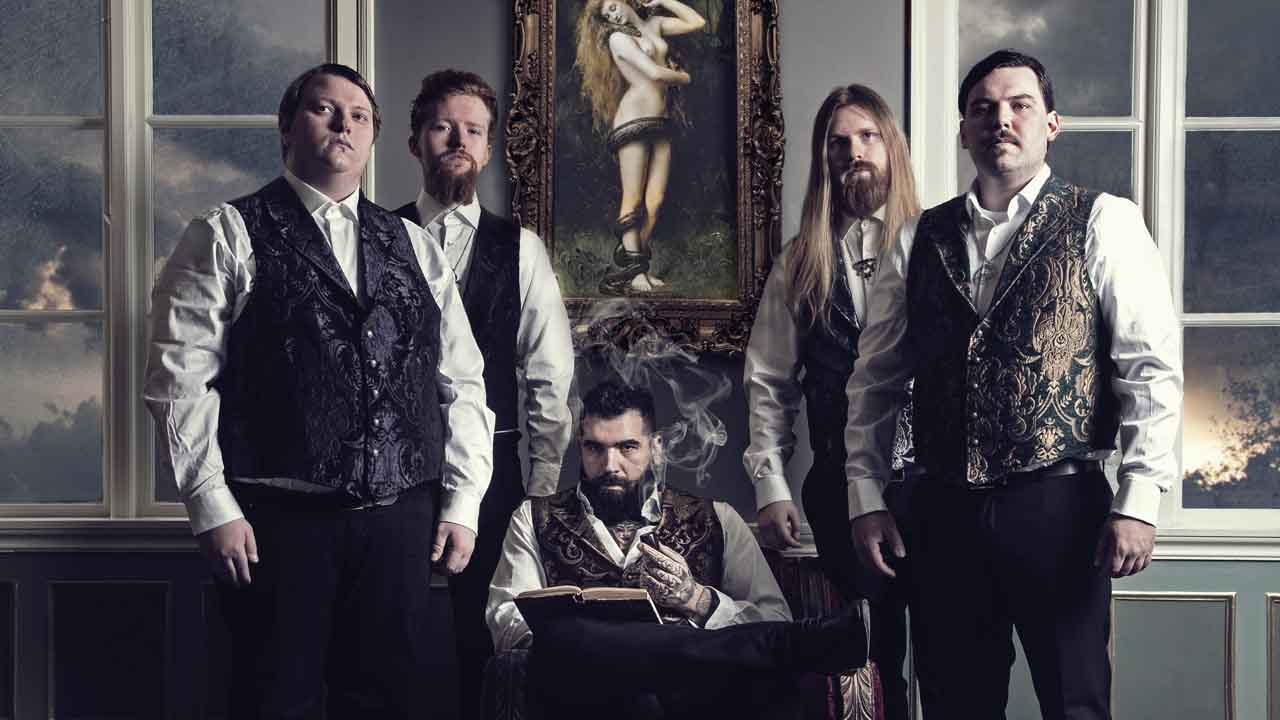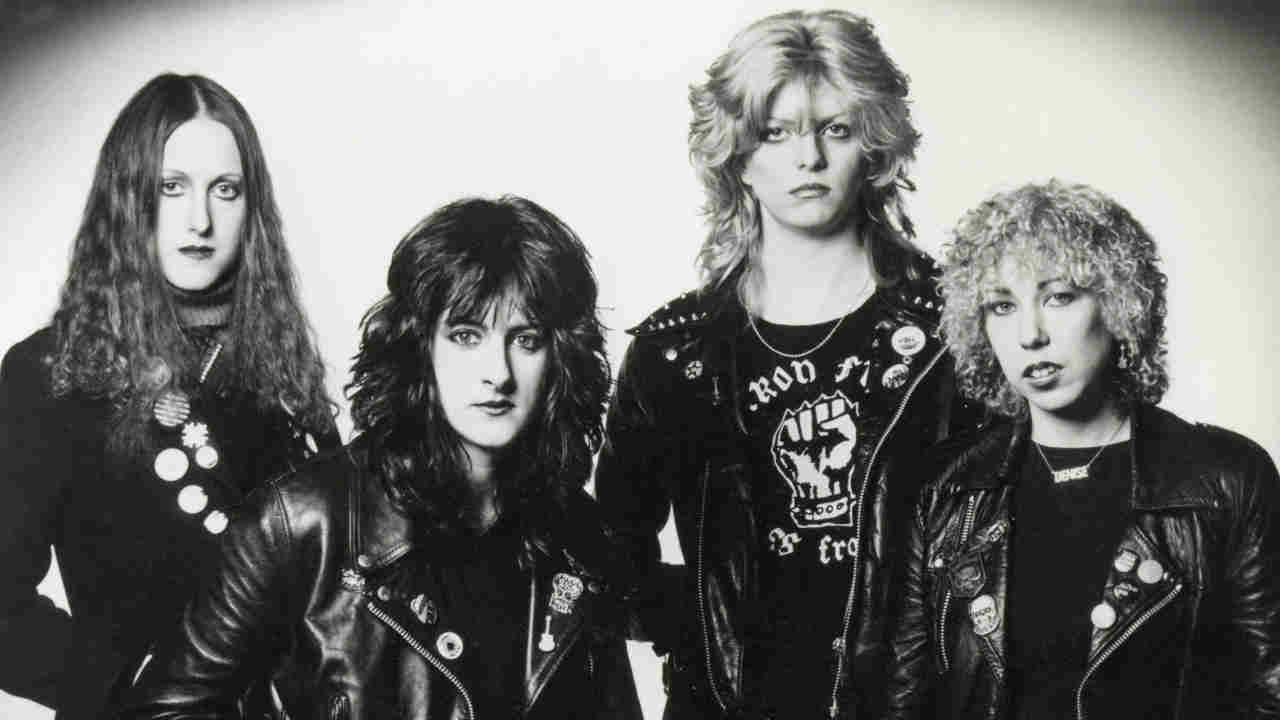Who needs Satan when you can have proto-feminist demon worship with your death metal?
Dapper Icelandic mavericks Cult Of Lilith are ditching death metal’s demonic clichés for a totally different occult deity

In ancient Hebrew mythology, Lilith is the first wife of Adam, the original man. Moulded from the same clay as her husband, she lived with him in Paradise before, defiantly, leaving, refusing to be subservient to him. She then aligned herself with the fallen archangel Samael and became a mighty demoness, possessing an insidious control of the night and male sexual fantasies. Lilith is the proto-feminist – a figure originally intended to be a twisted villain but now revered by many as a self-sufficient antihero who gained power by rejecting patriarchy. She’s a deity that Cult Of Lilith guitarist Daniel Hannesson literally worships.
“I always wanted to make a cult of something,” the Icelandic guitarist devilishly grins. “The holy image of a cult was always very interesting to me, being into horror movies and macabre things like that. I stumbled across Lilith and it just became very apparent to me that this is a goddess worthy of a cult of worshippers. In almost all religions and mythologies, there is some version of her.”
Daniel and his four fellow cultists worship Lilith not through prayer or ritual sacrifice, but via the medium of technical death metal. Their debut album, Mara, is dedicated to the malicious provocateuse; it honours her with a barrage of athletic riffs and frenzied blastbeats, in line with the bygone extremism of Necrophagist and mid-era Death.
The mythical nature of Cult Of Lilith’s subject matter is then hammered home by a number of head-turningly eclectic segues, utilising instruments as far-flung as the harpsichord and organ. Imagine the olden drama of Fleshgod Apocalypse fusing with the malevolence of Cattle Decapitation and you get the perfect portrait.
“There are so many things and musical ideas I want to try out,” says Daniel. “That was the whole idea: why not bring everything together in one band? It’s really challenging to use all these elements but still have a cohesive piece. I think that’s what excites me: to challenge, musically, both the listener and us playing the music.”
As a child, Daniel was surrounded by classical instruments. His grandmother owned a piano and his uncle an acoustic guitar, both of which he was “messing around with” from as far back as he can remember. His guitar playing got increasingly serious as he was introduced to Nirvana and Rage Against The Machine, and later Sepultura and Dimmu Borgir, to the point where he finally felt ready to start a band all of his own. The minuscule population of his home country, however, made that feat inordinately tricky.
“I was just on this endless search to find musicians to work with,” Daniel remembers. “It’s hard, especially on a small island like this, to find people that are on the same page as you. I was getting ready to give up on the dream, but I decided as a last-ditch effort to make an EP by myself; I would make a showcase for musicians around Iceland to take note.”
Sign up below to get the latest from Metal Hammer, plus exclusive special offers, direct to your inbox!
Using the Cult Of Lilith name he’d dreamt up long prior, Daniel recorded his EP, Arkanum, with a host of one-off session members. Featuring none of the guitarist’s more classical influences, it was a more generic offering than Mara, but it drew the ears of vocalist Mario Ávalos, who’d just immigrated to Iceland from Spain.
“I didn’t find it very interesting,” the singer admits. “I came from another band that was very straight, melodic death metal, and I was sick of it. At first, I said no, but when I heard the Mara demos, I wrote Daniel right away. I found it way more exciting!”
If Arkanum nailed the backbone of what Cult Of Lilith could sound like, then Mara is the complete corpus, jam-packed with character beyond the typical tech-death parameters. Not only have new instruments reared their heads, but Mario was able to add howling cleans to the mainstay growling.
Its lyrics, through a mix of English and Latin, are all centred upon Lilith herself, as well as the titular Mara: another demoness, this time found in Germanic and Scandinavian folklore, and who torments her victims with nightmares and sleep paralysis.
“Throughout the metal scene, it’s a cliché for it to be a male-dominated thing,” explains Daniel. “So, Lilith is rooted in everything we do. And then there’s also Mara on this album.”
“Everything is tainted with fantasy and related to Lilith, but the lyrics also deal with human emotion,” Mario adds. “Deep down, everything is connected to Lilith somehow.”
Starting in late 2018, Mara took almost a year to record and was fraught with difficulty. The band were in the studio every weekend without fail for 10 months, and Daniel’s perfectionism over what started as his own pet project often got the better of him. “Just getting the results exactly as we wanted it… it was hard,” he sighs. “I wanted to be a part of the whole process; I felt I was missing out if I wasn’t there while we were recording bass and the vocals. It was difficult, not being able to do anything else while we were doing this.”
The mythology, technicality and originality of Cult Of Lilith’s death metal has made it an incredibly time-consuming thing, but the band are already beginning to reap the rewards of their efforts. They’ve an envious deal with Metal Blade Records and an ever-increasing fanbase, meaning that Lilith’s occult glorification is only just beginning…

Louder’s resident Gojira obsessive was still at uni when he joined the team in 2017. Since then, Matt’s become a regular in Metal Hammer and Prog, at his happiest when interviewing the most forward-thinking artists heavy music can muster. He’s got bylines in The Guardian, The Telegraph, The Independent, NME and many others, too. When he’s not writing, you’ll probably find him skydiving, scuba diving or coasteering.
